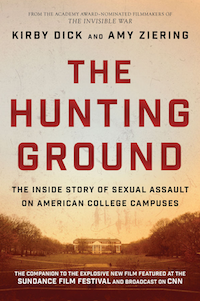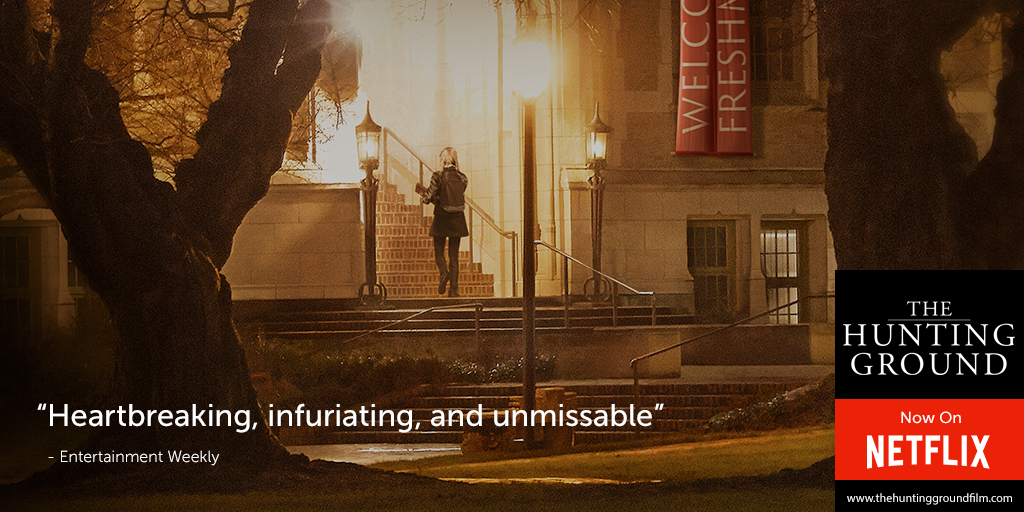
Lady Gaga’s performance at the 88th Academy Awards of her Oscar-nominated theme song from The Hunting Ground, titled “Til It Happens To You,” brought the house down. She shared the stage with 50 courageous survivors, many of them from the film, who received a standing ovation and who made it one of the most significant and memorable moments in Oscar history. Below, a few tell us in their own words why they stood up and what the song means to them (special thanks to Robbie Woodsum, a survivor, for these amazing photos).
Jacqueline Lin
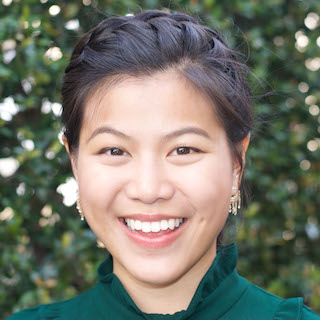
School: Stanford University
What inspired you to stand up and take the stage?
I need the world to start believing survivors. But even more, I need the kindhearted part of the world to recognize that sexual violence is not a solved problem. We are getting silenced more and more every minute by institutions with a power they are quick to wield—the legal power to gag survivors and destroy lives. I never want another survivor to feel the isolation I felt in continuing to fight against my university. She is a beacon for those of us who cannot speak onstage.
What was your reaction to the performance at the Oscars?
Her howl was heartbreaking and I was sobbing alongside every other survivor. During our first rehearsal for the Oscars performance, the 50 survivors and Lady Gaga made a pact to get a tattoo. As the designer, I created this original work of art to serve as the design for our tattoo. The design is to be used for tattoo purposes only and no other commercial purposes. If you have further questions or ideas, please let me know. The tattoo was made for and dedicated to survivors. It is a unity symbol inspired by the loops of our DNA structure and our universal infinity sign. It combines inspiration from Lady Gaga’s favorite flower, the white rose, to breathe life into an organic and growing symbol. The final image embraces a fiery shape to give us power and strength everywhere we go.
Fabiana Diaz
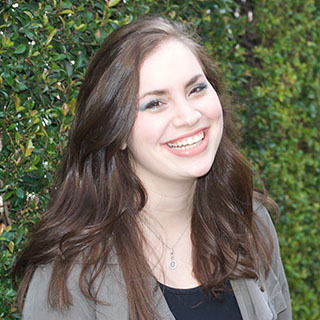
School: University of Michigan
What is your connection to The Hunting Ground?
I helped coordinate the viewing at my University in April and also had Annie and Andrea for a Q&A, which is where we connected.
What inspired you to stand up and take the stage?
What inspired me was her song. When I first heard the song in the film I broke down crying because I felt as if the song was written for me and about me. This song resonates with me, as much as it does with many survivors of sexual violence, and it allows me to push through. I was just so truly grateful that Diane Warren and Lady Gaga wrote this piece because the impact it is having on the movement is exactly what we need. Thank you!
What was your reaction to the performance at the Oscars?
This song has the power to bring every single emotion out of you from pain to bravery and it did just that for me.
Becky Stepp
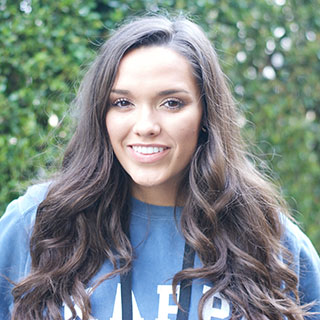
School: UCLA
What is your connection to The Hunting Ground?
After seeing the movie, I was inspired to share more details about my story as I had a very similar experience as many of the girls in the film, especially to Erica Kinsman and her fight with Florida State.
What inspired you to stand up and take the stage?
I came out with my story to help others not feel alone, to give people a voice that did not have the means to speak about their experience themselves. That’s why, when I got an email last week about standing on stage in solidarity with other survivors, I could not pass up the opportunity. Standing on stage was more than just a moment, standing on stage meant so much more. We stood there for the millions of people who have been assaulted and we proclaimed in silence that there needs to be a change on college campuses.
What was your reaction to the performance at the Oscars?
When I heard “Til It Happens To You”, I finally felt that someone understood. Being assaulted is just a phrase until you have to deal with the indescribable pain and loneliness. This song gives people who feel alone at least one person who gets it.
Lea Roth
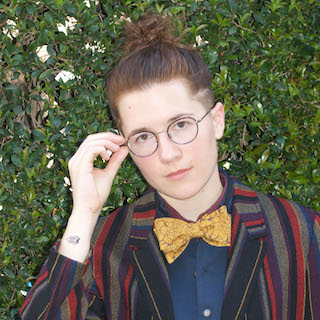
School: Dartmouth College
What is your connection to The Hunting Ground?
My activism with #RealtalkDartmouth and #EdActNow was featured in The Hunting Ground, as well as a visit visit Annie Clark during Nastassja’s and my organization Spring Up’s workshop tour.
What inspired you to stand up and take the stage?
It’s always a powerful experience to participate in collective activism, and I wanted to share this moment with other survivors who have been using their voices and actions to advocate for change every day for years.
What was your reaction to the performance at the Oscars?
Her performance on the night of the Oscars was so powerful, so honest, so vulnerable, and raw—it was such an incredible honor to share in her creative process and to create a piece of performance art that touched so many people.
Nastassja Schmiedt
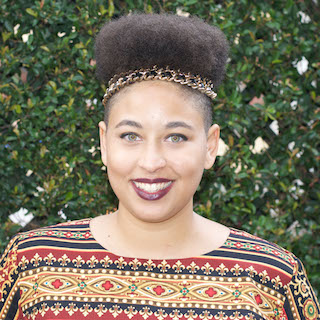
School: Dartmouth College
What is your connection to The Hunting Ground?
I was included in The Hunting Ground discussing my experience of sexual assault, I’m depicted talking with Annie Clark in Los Angeles during my workshop tour with my company, Spring Up, and my protest at Dartmouth College was depicted at the end of the film.
What inspired you to stand up and take the stage?
I decided to participate because it is so important to have LGBTQ, genderqueer, and black survivors visibly included in the discussion as we experience sexual violence at higher rates and are less likely to be believed. It’s a privilege to be able to speak publicly about my assault without losing the support of my family, and I was honored to be able to partake with my fiancée Lea Roth.
What was your reaction to the performance at the Oscars?
Hearing Lady Gaga perform “Til It Happens To You” was surreal, I have expressed each of the ideas behind every line in one way or another—and to feel heard and mirrored by someone I have admired for years expressing those same concerns on such a huge stage is something I will never forget.
Kirat Sandhu
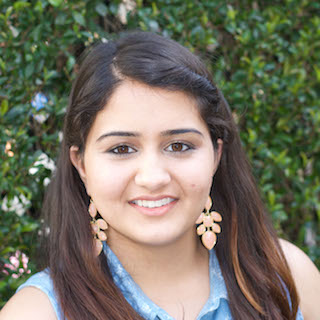
School: Indiana University, Purdue University Indianapolis
What inspired you to stand up and take the stage?
Honestly, I was inspired to stand up and share that stage and my story because I wanted to break the mold of what my Punjabi-Indian culture has deemed normal. It’s normal for experiences with sexual violence to be swept under the rug, and I want more people who look like me and come from similar backgrounds to know, that they are not alone in what they’ve been through.
What was your reaction to the performance at the Oscars?
I felt angry, sad, and liberated all at once. I know the pain of what happened to me will never go away, but being on that stage and hearing her sing was validation for every time I have fought to share my story.
Chloe Allred

School: Cornish College of the Arts, Laguna College of Art and Design
What is your connection to The Hunting Ground?
I saw The Hunting Ground at the Seattle International Film Festival. I went with a friend and I didn’t know much about it, just that it was a documentary. The film stunned me—with story after story like my own, not just of surviving sexual assault, but of being abandoned and shamed by peers, friends, schools, family, etc. In my own life, I found the friends who truly cared about me and stuck by my side. That helped me survive. After the film ended, there was a Q&A with Amy Herdy, one of the producers. I approached Amy after the Q&A. I was a real wreck, I had been crying for about 80% of the film, but I felt deeply grateful that The Hunting Ground team was addressing this in such a huge way. I make paintings about survivors of sexual assault and eating disorders. It has been my way of processing my own experience, and also of giving a platform to other survivors. I gave my card to Amy, she looked up my work, and we’ve been in consistent contact since!
What inspired you to stand up and take the stage?
I am deeply passionate about this topic. It guides my artistic practice and activism. Through the Body Joy Project, I have worked with numerous survivors of eating disorders, sexual assault, and body shame. Their bravery and resilience is truly inspiring. Their willingness to share their story with me and allow me to paint them has been an honor. The opportunity to be on stage with Lady Gaga and the other survivors just felt right. I wanted to take a very public stand against rape culture. It was exciting, but definitely not easy. Addressing my rape in public is hard, and it brings back a lot of pain from that experience. But it is also healing to take ownership of my story and show other survivors that they have nothing to be ashamed of, that they did nothing wrong.
What was your reaction to the performance at the Oscars?
A punch to the heart, in a good way.
Jasmin Enriquez
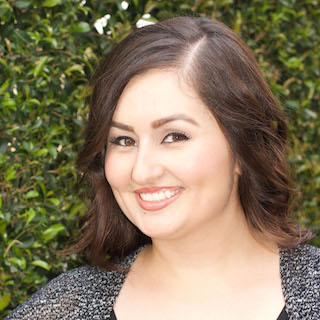
School: Penn State University, University Park
What is your connection to The Hunting Ground?
I was interviewed for the Hunting Ground a while back. The first time I was raped I was in high school. The second time I was raped I was in college but I never reported either assaults so my experiences didn’t necessarily fit the documentary narrative. I still do Q&A panels around San Diego with the film, though!
What inspired you to stand up and take the stage?
I knew there would be hundreds of thousands of people watching the Academy Awards who were survivors. I wanted them to know that they are not alone. I wanted them to see that there are people in the world fighting for them, and with them, to create change. To me, it was important for them to know that we were all standing in solidarity with them.
What does “Til It Happens to You” mean to you?
Hearing Lady Gaga sing “Til It Happens To You” made me feel emotional but most importantly it made me feel like other people understood my pain.
Hannah Schiller
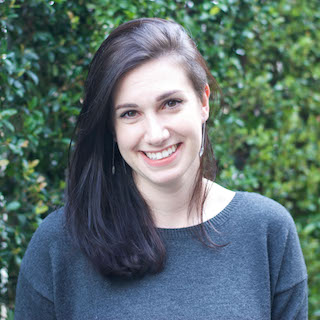
School: MIT
What is your connection to The Hunting Ground?
I was interviewed for the film and appeared in it for a short time.
What inspired you to stand up and take the stage?
When I was asked to take part in the performance, I immediately agreed because it was an amazing opportunity to help promote a cause I am passionate about on the Oscars stage. As the performance drew nearer, it became more important to me to be on that stage, to let survivors know that they are not alone, they are believed, and they should not be ashamed.
What does “Til It Happens to You” mean to you?
I avoided listening to the song until after I agreed to be in the performance, because I knew it would be upsettingly accurate (and it is).
Stephanie Feldman
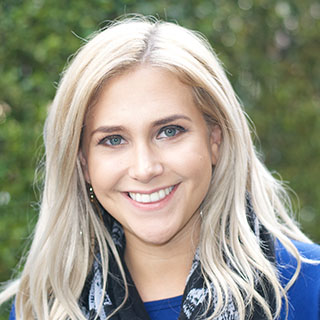
School: Scripps College
What is your connection to The Hunting Ground?
I have friends who were in The Hunting Ground and I’ve felt such a deep connection to the film’s message. I am so grateful that I was given this opportunity to be a part of it.
What inspired you to stand up and take the stage?
Speaking out and taking a stand is such a huge part of my healing process and it’s why I’ve dedicated myself to providing a platform for survivors to share their voice with my project, Be Heard. Being honest about my experiences is empowering to me and being given the chance to stand alongside other brave, strong and outspoken activists was simply a dream come true. This was such a special opportunity to be able to stand for survivors everywhere and to raise awareness around the world.
What was your reaction to the performance at the Oscars?
It was breathtaking, she sings with such conviction. I think almost every survivor can relate to the song, it’s a testament to the problem of rape culture in our society. You shouldn’t have to be a survivor to understand the devastation of sexual violence, hopefully one day we can live in a world where that’s no longer the case.
Ariane Litalien
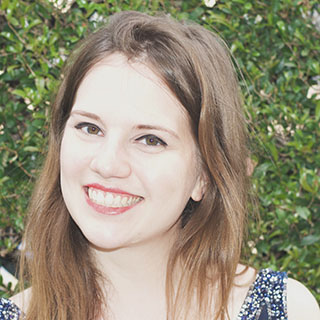
School: Harvard University, McGill University
What is your connection to The Hunting Ground?
I was sexually assaulted by a classmate who lived in my dorm at Harvard. I was interviewed about my experience for The Hunting Ground in fall of it made such a huge impact on my life. It taught me that my voice mattered at a time when it was being constantly suppressed by administrators.
What inspired you to stand up and take the stage?
Getting to know fellow survivors at Harvard, as well as Annie and Andrea from The Hunting Ground, helped me get through the past three years, and made me feel so much less isolated. I wanted to pay it forward and let other people know they are not alone.
What was your reaction to the performance at the Oscars?
I cried the first five times I heard it, and cried again after every rehearsal at the Academy Awards. There is something about this song that perfectly embodies the essence of what being a survivor feels like. It is just so incredibly cathartic to hear it.
Ibis Valdés
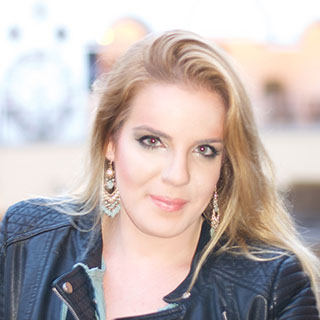 School: Northeastern University
School: Northeastern University
What is your connection to The Hunting Ground?
I was interviewed in October when I was the Director of Communications at Northeastern’s Feminist Student Chapter. I received an email in our group account from the producers looking to make a documentary about sexual assault culture on US college campuses. I agreed to an interview where I spoke about my assault, how the university handled it, and the activism I’ve done since.
What inspired you to stand up and take the stage?
Once I heard news that Lady Gaga signed on to promote the documentary through a song, I knew the theme and message of the documentary would instantly reach millions. I just didn’t anticipate HOW. I was inspired to stand up there for my fellow feminists of all backgrounds; for my Latinx feminists; for friends of mine who have shared their sexual assault stories with me; and lastly for myself, as a beautifully poignant redemptive moment for all the times I was depressed, unfocused, and isolated because of what happened to me.
What was your reaction to the performance at the Oscars?
I
was inspired, moved, and one step closer to healing and full redemption from my assault.
Emily Farley
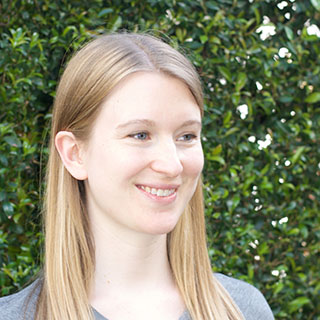 School: University of Notre Dame
School: University of Notre Dame
What is your connection to The Hunting Ground?
I was interviewed for the film. The producers found me based on news articles about the play that I wrote as a student called Loyal Daughters. Discussions surrounding The Vagina Monologues were getting tangled up in arguments on morality, its relevance on a Catholic campus, and shock value rather than the important topics of sexual violence and sexuality. I wanted to create something by, for, and about Notre Dame students, that spoke to sexuality and sexual violence as experienced by my peers, so the message couldn’t be ignored. After conducting about 60 interviews with students, faculty and staff and collecting written submissions, I compiled them into a series of anonymous short scenes. With the help of a huge team of talented, passionate people, we put on an amazing multiple-night run to a packed house each time. I’m honored and proud that it continues to be adapted, updated, and produced annually—ten years later.
What inspired you to stand up and take the stage?
I wanted to stand up on stage for all the people who so bravely and generously shared their stories with me back at Notre Dame so that together, we could educate, support and inspire the rest of the student body. I wanted to stand up for the people who saw themselves represented on our stage back at Notre Dame, and represent them on the Oscar stage with Lady Gaga. I wanted to stand up for me because despite all of my theatre activism at school, I focused on the stories of others and tried to bury my own, seeing it as irrelevant and insignificant. I was completely in denial about my own experience of assault until I saw an eerily similar situation reflected back to me by a sexual assault awareness program called Sex Signals put on by Catharsis Productions, hosted by Notre Dame. It wasn’t until that moment that I could begin to process what had happened, which led me to dedicate the rest of my college career to working to help myself and others through it. That is the power of creative sharing.
What does “Til It Happens to You” mean to you?
I am not alone.
Kevin Kantor
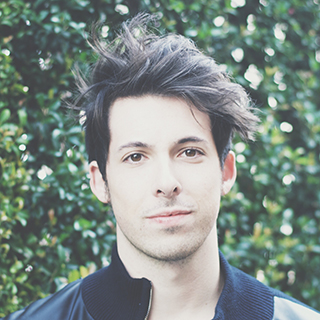
School: University of Northern Colorado
What inspired you to stand up and take the stage?
After I went public with my story, and the subsequent exposure that my poem “People You May Know” received, I was incredibly humbled by the wealth of love and support that flooded in from fellow survivors and allies to the cause. I was afforded a platform to speak out and educate on these critical issues & have been doing so since I graduated in May. However, as an actor, my first few post-graduate experiences attempting to find representation left me feeling lost and defeated again. Just days before I was invited to join Gaga at the Oscars, I was told in an agency interview that it would be problematic to sign me because of how public I had gone with my rape, that my image was “unpalatable” and “too difficult to sell.” Being a survivor is not something you become, it is something that you do. Every day. Standing on stage with all of those brave and brilliant humans, Gaga included, was just one act of our collective ongoing survival story. The opportunity to exist as loudly and defiantly as we did in front of so many respected members of my industry lent me the reaffirmation of my worthiness, and the worthiness of survivors everywhere, at a time when I needed it most.
What does “Til It Happens to You” mean to you?
It brings hope that survivors everywhere will feel validated and heard with this anthemic song, this battlecry.
Aryle Butler
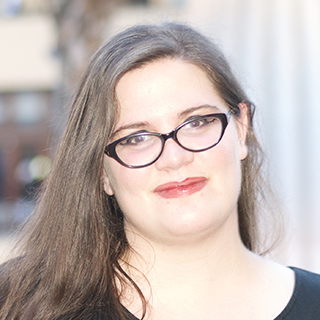
School: UC Berkeley
What is your connection to The Hunting Ground?
I was part of the film, and took part in filming for over three years as a survivor, activist, and passionate supporter of the message. I also formerly worked with End Rape on Campus (EROC) and took part in the premiere at the Sundance Film Festival and subsequent Q&As.
What inspired you to stand up and take the stage?
Sexual assault can be isolating, and knowing that others will see all of us, together, and know they are not alone is the greatest gift I can give to other survivors I have yet to meet. I work doing violence prevention community education at Human Options in Orange County, and know that showing my community in Southern California that strong survivors stand up on this issue was important for me. It’s a way to give back to the community and to be a part of something greater than myself. Throughout all of my academic work, my legislative and activist work at the state and federal level, and all my own personal healing work, I am always in awe of the beauty and strength that takes root when individuals forged in tragedy and adversity create communities of immeasurable love and incredible power. Standing together is as close to invincible as any one person could be.
What does “Til It Happens to You” mean to you?
Until you do something, it will happen to too many.
Nora Bales
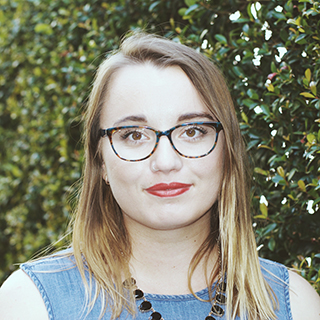
School: California Polytechnic State University at San Luis Obispo
What is your connection to The Hunting Ground?
I wasn’t in the Hunting Ground, but my best friend Ari Mostov was.
What inspired you to stand up and take the stage?
I’ve never publicly shared any aspect of my story, and I rarely privately share anything about it either. This issue has long been very important to me—I personally am a survivor and many of my closest friends are, too. What ultimately gave me the courage to stand onstage was the memory of my friend Sasha, who took her life after an intense legal and personal battle following her sexual assault at her school, University of Missouri. (Her story: http://espn.go.com/espn/otl/story/_/id/10323102/university-missouri-officials-did-not-pursue-rape-case-lines-investigation-finds.) Too much goes unsaid, and for too long I’ve been relying on the strength of others to make changes in how rape and sexual assault are dealt with on college campuses and our culture at large. I’m finally ready to share what happened to me.
What was your reaction to the performance at the Oscars?
I felt simultaneously brave and terrified, and that I definitely made the right choice.
Julia Dixon
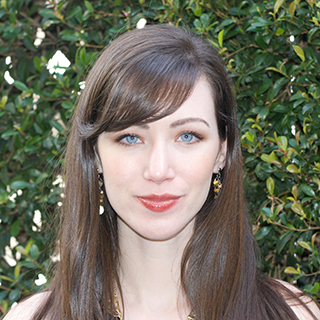
School: The University of Akron.
What is your connection to The Hunting Ground?
I appear in the documentary talking to Annie and Andrea via Skype, discussing the Clery complaint that they helped me file. I am very lucky to have so many people I consider friends in the documentary.
What inspired you to stand up and take the stage?
I thought about what it would have meant to me when I was 18 or 19, recently assaulted, to see this kind of stand on the world’s biggest stage. It would have made me feel less alone; it would have emboldened me. I know there are still so many people going through their recovery in that lonely space, and I want to help them get out of it as fast as possible.
What was your reaction to the performance at the Oscars?
I felt overwhelming solidarity with people I had never even met, and strength to keep moving forward.
Rose Richi
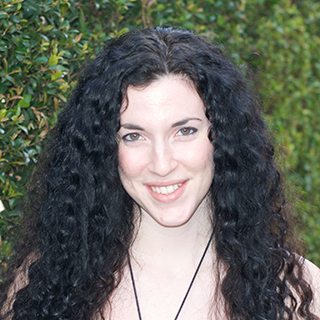
School: University of Connecticut
What is your connection to The Hunting Ground?
I interviewed for the film and made a small appearance towards the end; the clip is from one of the many news outlets that followed our title IX lawsuit against UConn.
What inspired you to stand up and take the stage?
The opportunity to reach millions of people in one moment. Lady Gaga is an incredible person who is standing up to an industry and a culture that shames survivors and I wanted to be a part of that.
What was your reaction to the performance at the Oscars?
There aren’t words to describe how I felt on that stage; it was transcendent.
Sage Carson
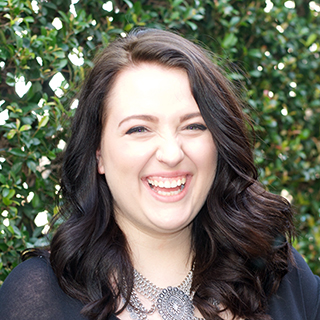
School: University of Delaware
What is your connection to The Hunting Ground?
I have spoken on panels for The Hunting Ground about my work surrounding sexual assault in Delaware and on UD’s campus.
What inspired you to stand up and take the stage?
I stood with Lady Gaga and other survivors on stage to show survivors across the country that they are not alone and that they are loved. I isolated myself for so long after my assaults because I felt no one would believe me or knew what I was going through. I hope that the performance showed other survivors that there is a community of people like them who believe them and will always support them. I stood on stage with an inspirational group of survivors in hopes of giving other survivors the strength they need to heal.
What was your reaction to the performance at the Oscars?
I felt like I wasn’t alone anymore.
Angelo Alessandro Rodarte
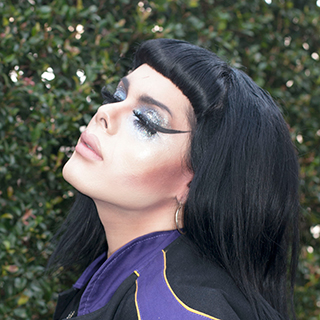
School: California Institute of the Arts
What inspired you to stand up and take the stage?
First and foremost, as a gender non-binary chicanx person, I stand for all trans*, queer, non-binary, LGB people and people of color. I have been deterred and silenced for a long time. Sexual assault can occur to all people of all walks of life. It’s not specific to race, age, gender, sexuality, lack of, or any other fictions we have been forced to believe—or constructs we are forced to live in. As victims, if we don’t come forward, this injustice will continue to thrive and affect more people than we can imagine.
I felt it was time to no longer stand silent on something we have been taught to be ashamed of. Even more so, it’s time to no longer allow ourselves to be oppressed by institutions that have much to gain by our silence.
I felt an obligation to not only change, but to set a larger stage for the dialogue. We are not victims, we are survivors.
What does “Til It Happens to You” mean to you?
Hearing “Til It Happens To You” challenged me to take back authorship of my body and emotions that previously felt both manipulated and stolen from me.
Andrew Brown
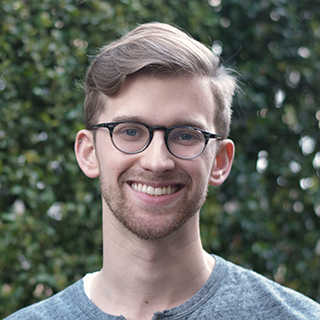
School: Brown University
What is your connection to The Hunting Ground?
I was featured in The Hunting Ground.
What inspired you to stand up and take the stage?
I wanted to take this opportunity to tell survivors who haven’t told anyone that they’re not alone and they are beautiful.
What does “Til It Happens to You” mean to you?
The first time I heard “Til It Happens to You,” it immediately brought me back to the confusion and pain I remember feeling between my assault and the first person I told. I knew the song and our performance could help people understand how difficult the experience can be for survivors and how deserving we are of respect
.
Zerlina Maxwell
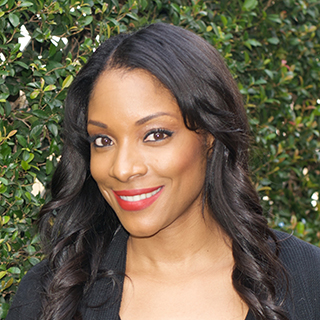 School: Tufts University
School: Tufts University
What is your connection to The Hunting Ground?
I met the stars of The Hunting Ground through my own work advocating against rape culture. As a journalist, I’ve covered campus sexual assault for a variety of publications and through that work have become connected with the network of students filing Title IX complaints against their colleges and universities.
What inspired you to stand up and take the stage?
I wanted to show that even after sexual violence, you can live a happy life! I wanted to show those at home that they are not alone. I wanted to stand in solidarity with others who have a shared experience of overcoming the most intense form of adversity.
What does “Til It Happens to You” mean to you?
At the beginning of the song I feel rage and sorrow, but by the end of the song I feel powerful and determined.
Myra Crimmel
 School: University of California, Santa Barbara
School: University of California, Santa Barbara
What is your connection to The Hunting Ground?
I filed a Title IX/Clery Act Complaint with the assistance from Sofie Karasek, who was in the film and is now one of the founders of End Rape on Campus.
What inspired you to stand up and take the stage?
I wanted to be around other survivors who took action against their perpetrator and consequently had to fight against our own universities’ administrations.
What does “Til It Happens to You” mean to you?
Sexual assault is just another word until it becomes the pain you live with for the rest of your life—don’t judge us.
Ryan Clifford
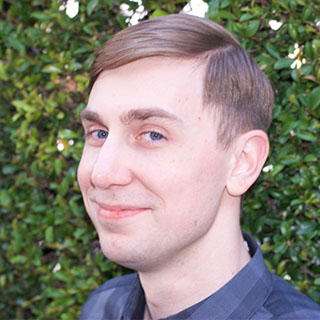 School: University of California, Davis
School: University of California, Davis
What is your connection to The Hunting Ground?
The Hunting Ground filmmakers interviewed me, a male victim of a sexual assault.
What inspired you to stand up and take the stage?
I want others to know that I am a male victim who was sexually assaulted and brutally hazed by fraternity members. I have learned that no one wants to recognize that even a male can be a victim of a sexual assault and even if one believes it can happen, no one wants to talk about it.
What does “Til It Happens to You” mean to you?
Lady Gaga brings life into the song for victims to know that they are not alone.
Melissa Maher
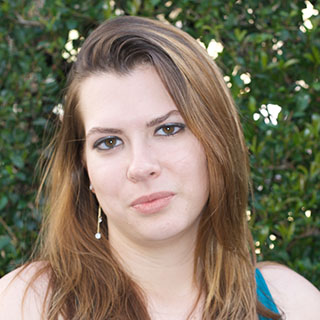
School: Iowa State University
What is your connection to The Hunting Ground?
My friend, Annie Clark, is one of the main subjects in The Hunting Ground. She let me know about the film when it was being made and let me know they were looking for subjects, but at the time I couldn’t participate because I was involved in an active lawsuit about my case.
What inspired you to stand up and take the stage?
I stood for every person who couldn’t stand up. I had also decided if I could get one person to realize they’re not alone, I was doing something to help.
What does “Til It Happens to You” mean to you?
This song makes me think about everyone who told me I was fine, when they never knew what I was dealing with. The problem doesn’t disappear just because you stop thinking about it.
Robbie Woodsum
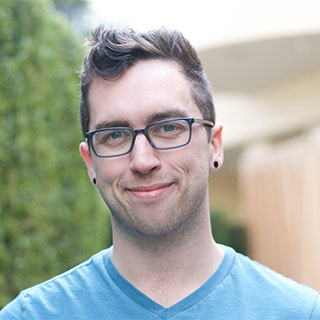 School: George Mason University
School: George Mason University
What is your connection to The Hunting Ground?
I was interviewed for The Hunting Ground and appeared in the film.
What inspired you to stand up and take the stage?
My therapy dog had died unexpectedly and then I got the invitation to join my fellow survivors onstage with Lady Gaga. Life is a cycle of ups and downs, and this is one of those. It’s like the universe knew I needed excitement and distraction. Plus I would never give up an opportunity like this. Meeting my fellow survivors was the best part. We formed quick bonds and life-long friendships. Without their support, I don’t know how I would have managed through this past weekend.
What does “Til It Happens to You” mean to you?
The first time I heard it, I cried. It embodies perfectly how you face the world as a survivor. You just don’t get it, until it happens to you.
Thanh Mai Bercher
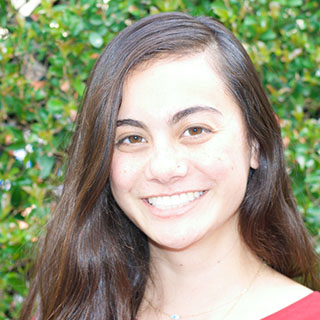
School: The University of California, Berkeley
What is your connection to The Hunting Ground?
Most of the people who helped me and taught me how to help my friends are featured in the film. Working with them and getting to know Kirby was empowering in terms of having this issue be recognized beyond the confines of our campus. The Hunting Ground was the first place in which I saw our work validated. No other institution recognized the importance of our efforts and experiences.
What inspired you to stand up and take the stage?
So many of the survivors that I know don’t feel validated, because they think that they are alone and have yet to hear that they deserve to be loved and supported. I hope that people who see this film, hear the song, or see us standing there can recognize that there are other people out there who have felt what they are feeling and continue to fight.
What does “Til It Happens to You” mean to you?
Lady Gaga conveys so much emotion and care, and this song just completely encompasses how it feels to experience trauma and have to navigate interacting with other people.
Molly Mescall
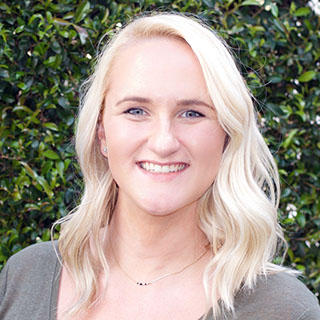
School: Saint Mary’s College/Notre Dame
What is your connection to The Hunting Ground?
Yes, I appeared in the film speaking about my experience at Notre Dame.
What inspired you to stand up and take the stage?
Being a part of The Hunting Ground film, I feel that saying yes to this experience was only natural. Sharing my story with others has helped me to heal and I can only hope that it can help others who may be in the position I was once in.
What was your reaction to the performance at the Oscars?
Lady Gaga’s performance of Til It Happens To You was extremely powerful to witness, and was yet another reminder that I am not alone in the pain that I have experienced.
Maya Weinstein
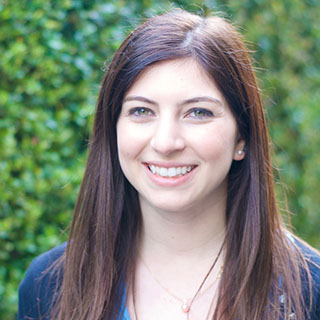
School: George Washington University
What is your connection to The Hunting Ground?
I was featured in The Hunting Ground.
What inspired you to stand up and take the stage?
Ever since The Hunting Ground, I have seen how sharing a story brings others the strength to share theirs. The more the issue is brought to light, the more power survivors feel to stand up and stand together. I have always looked up to Lady Gaga, and was drawn in by her genuine devotion to making the world a better place. I couldn’t think of a more intense and special way to reach such a huge audience and inspire many more survivors to share their stories.
What was your reaction to the performance at the Oscars?
When I heard Lady Gaga sing “Til It Happens To You,” I felt connected to everyone on that stage. I felt something way bigger than myself and I realized the power that we all held by simply standing in unity.
Ali Arman
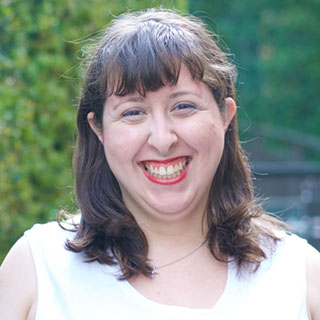
School: UC Berkeley, Harvard University
What is your connection to The Hunting Ground?
I was interviewed in the film. I shared how hard it was to tell my parents about my assault, and I discussed the toll my assault had on my mental health.
What inspired you to stand up and take the stage?
I wanted to show people that there’s life after sexual assault. In my interview, I talked about attempting suicide. By sharing my story, I want people to know that there is so much more out there than the pain they’re feeling. There are new friends and bad dates you haven’t met yet; there are amazing successes and crushing failures you still have to learn from; there are gorgeous sunrises and moments of being that you deserve to be alive to see. I shared my story so people will know that sexual assault is not the end of their stories.
What was your reaction to the performance at the Oscars?
First I cried, then I smiled.
Wagatwe Wanjuki
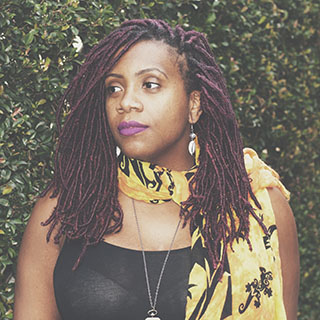
School: Tufts University, Rutgers University
What is your connection to The Hunting Ground?
I was interviewed for it and appear briefly in the documentary.
What inspired you to stand up and take the stage?
I wanted to participate in a once-in-a-lifetime opportunity that would be a historic moment in the visibility of survivors.
What was your reaction to the performance at the Oscars?
I was blown away and touched by the pure emotion she exuded during her performance.

